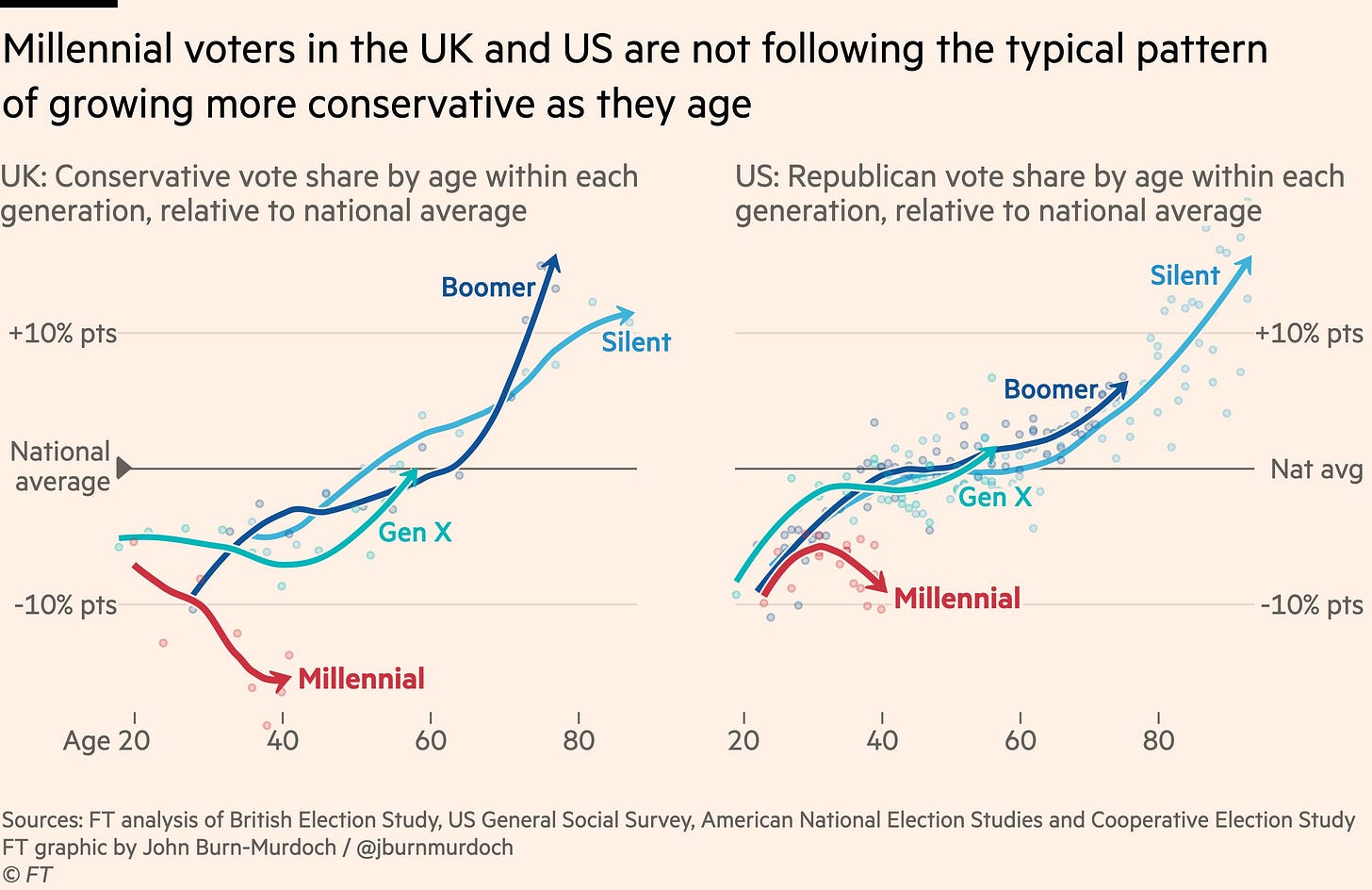No, Jesus Wasn't a Socialist Either.
The Christian Left is in danger of making the same mistakes as the Christian Right.
An interesting new Financial Times study went a long way towards confirming something that has sort of felt true for a while: Contrary to previous generations, US and UK Millennials are not getting more conservative as we get older.
This used to be how things worked. Conservatives could stand to let voters get the lefty energy out of their systems in their teens and twenties, confident that they’d come around once they settled down and started having families. Just look at the hippies, the crew behind one of the great countercultural movements in the U.S., who made common cause with the Civil Rights Movement and saw history vindicate their protests of Vietnam. No sooner did they start owning homes than did their votes started swinging red. Today, they’re just the widely maligned “boomers.”
But so far, Millennials seem to be bucking the trend. The reasons for this are, as it turns out, fairly well understood. And if we internalize them, we can hopefully do better at avoiding some looming red flags. Because while I am staunchly on the political left, I’m not as enthusiastic about this trend as I wish I could be.
So, why aren’t Millennials following their parents down the path towards conservatism? The knee-jerk answer is houses. Homeownership poured a lot of water on the counterculture fire of the 60s and 70s. When you’re young and uncomfortable by nature, it’s easy to call for change. Once you start acquiring things you want, change has a tangible price tag.
But that’s not really an issue we Millennials have. We can’t afford houses, families, healthcare or any of the other things that breed contentment and complacency. We came of age during the global financial crisis, when the gilded curtain of capitalism fell away to reveal a ramshackle school science fair experiment held together by pipe cleaners, rubber bands and scotch tape. The Occupy Wall Street movement probably shaped us more than we give it credit for. We’re less trustful of financial institutions, less enamored by wealth and more in favor of redistributionist economic policy because, for most of us, the American Dream is stuck in first gear. You’ve read all about this.
But that’s not the only factor at play here. Because even Millennials who do own homes (full disclosure: me and my wife, thanks to our parents) aren’t getting more conservative with age. Reagan was able to soothe a lot of the angriest hippies by giving them cheap homes, but the Financial Times survey strongly indicates that the same tactic wouldn’t work for today’s Millennials, even if it was feasible.
Because the other main reason Millennials aren’t interested in conservative politics is the culture war. The culture war “has been undoubtedly successful for conservative parties over the last decade, but [may] now come back to bite them,” writes John Burn-Murdoch. “Culture war issues generally map very neatly onto education, so it should hardly be surprising that they go down badly with the most well-educated generation in history.”


Conservatives have ignored their record low popularity among Millennials (and Gen Z voters) recently, but the last few elections show that they really can’t do so anymore. Record low turnout among young voters in 2016 reshaped American politics, but Republicans have suffered crushing disappointments in each subsequent election, almost entirely thanks to a 40-and-under vote that isn’t going to get any more conservative as it ages upwards.
There is a complicated faith angle here that looks like it will be growing in the coming years. You can’t really talk about conservative politics in the U.S. without talking about the Moral Majority. The evangelical power players that re-grouped after Nixon and rallied around Reagan ended up crafting the most unified and reliable voting bloc in the American electorate. True, they had to re-define “evangelical” into an amorphous blob of special interests to do it, but what’s the Bebbington Quadrilateral when unified control of the federal government is on the table?
And so, for a fairly sizable chunk of American Christians, voting Republican is part of following Jesus. Or, it was, for a long time.
Linking the Bible to right-wing social and economic interests proved to be an electoral jackpot. And while there is clearly still a lot of gas in that tank, the Financial Times study suggests the winds are changing among American voters. And I think it goes without saying here that the Trump stuff dispelled a lot of younger Christians of the notion that the teachings of Jesus meaningfully motivate the GOP.
But my concern is that the shoe is transferring to the other foot now. I’m worried that there’s a growing movement among Christians who feel that if Jesus isn’t a Capitalist, then he must be a Socialist. I don’t think I’m being paranoid. You can see this in the “Jesus was a socialist” posts or any one of these apparently endless remixes of this meme. This is Jesus as political prop, and it’s every bit as cringe as that “Christian, American, Republican, in that order” energy.
I want to be careful here. I like Marx. I do think workers should own the means of production. I owe so much of my faith to beautiful movements in Christian Socialism, and people like James Cone, Dorothy Day and Cornel West. I’m the sort of Christian leftist who is profoundly irritated by how timid and milquetoast our current crop of Democrat leaders are. I want healthcare and education to be free, the environment to be protected, police to be defunded and prisons to be abolished. All that stuff. What I don’t want is for Jesus to become a two-dimensional mascot in any of this stuff the way he has on the Right.
Keep reading with a 7-day free trial
Subscribe to clusterhuck to keep reading this post and get 7 days of free access to the full post archives.






